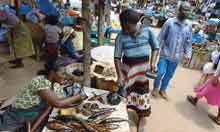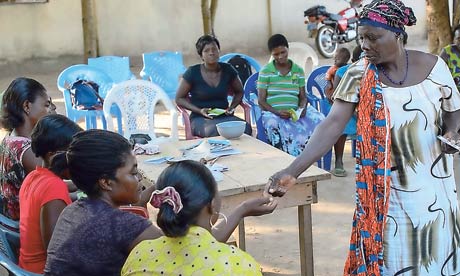It's 4am and the pungent smell of fish permeates the air in the Ghanaian village of Dabala, as Patience Diaba, 36, smokes her produce over an open fire. Six hours later, she carts the tilapia fish to market.
She sets up her fish on a wooden table and, perched on an upturned bucket, starts to sell. It's 50 pesewa (15p) for a small fish and GH¢1 (30p) for a larger one. The shouting hawkers, together with the dirt, dust and stifling heat, assault every sense, but Diaba will sit and sell until the sun goes down. On a good day she can make GH¢50 (£16) profit, she says.
Diaba is an entrepreneur out of necessity. There is no social safety net for her, no jobseeker's allowance or benefits. If her family wants to eat, drink and go to school, then she must make money any way she can.
A loan from her Village Savings and Loans Association (VSLA) in the Volta region, about two hours drive from Accra, allowed her to buy a box of 250 fish for GH¢100 (£33).
The VSLA is part of the Banking on Change programme that has reached more than 88,000 people in Ghana, teaching those with no access to banks how to save in a self-sustaining group. Saving is hard for the 30% of Ghanaians who live on less than £1 a day. It does not provide relief from hunger, thirst or illness, and it requires discipline.

The VSLA eases the process. Once a week at 6am, Diaba meets up with 20 other people from her village who save funds from which they can borrow at an interest rate of 10%. The money is locked inside a metal box using three different keys and taken home by the chair of the group.
Diaba can borrow three times the amount she has saved and only has to save what she can afford. The minimum investment is GH¢1 (30p) and she can use that to buy a share of the savings pot. At the end of the year, the savings are shared proportionally, according to the number of shares members own. Interest from the loans is added to the dividend.
Diaba has never before had access to a bank, and she is not alone – according to the World Bank, more than 2.5 billion adults in the developing world have no access to bank accounts, savings or credit. She has no formal address or identification, and most banks are located far from her village.
The VSLA teaches people how to overcome these problems. Every member is from the same community, and the group makes collective decisions about who is allowed to save and how much interest to charge. Microsaving does not require the same external support as formal banking; it allows the group to be self-sustainable.
"I used to struggle with money," says Diaba, "but now I have control over my finances."
According to a survey by Plan UK, more than half of Ghanaian women say they don't have the skills to save, yet 90% believe it is a priority. The groups will carry on meeting each week now that they have the knowhow to save, even though the formal training ended in September.
Eighty-one per cent of those involved in the Banking on Change programme are women. They use the VSLA to enhance household income and access education and healthcare.
"Women in Ghana have the ability to lift themselves, their families and their communities out of poverty," says Marie Staunton, chief executive of Plan UK. "They have incredible ambition – they just need the tools to help them realise it."
The three-year programme, which started in 2009, was pioneered by Barclays, Plan and CARE International UK and rolled out to 11 developing countries, reaching 488,000 people. In Ghana alone, the groups have saved more than £1m and made loans totalling £750,000.
"I was sceptical of the programme after having bad experiences with local moneylenders and microfinance organisations, where they ran off with my money," says Diaba, "but together we decided to give it a try and I'm glad I did."
At meetings, each member will contribute a small amount to the social fund, to provide a form of insurance that can assist in emergencies.
"Women in Ghana have proved that saving a little, regularly, can help achieve a more resilient future," says Catharine French, Barclays retail and business banking director of corporate affairs.
Diaba is one of 9 million Ghanaians working in the informal sector, fuelling a cash-driven economy. Like many, she invests in a small business in which she has seen others making a profit, and hopes to do the same. She cannot afford the risks that large-scale entrepreneurship entails; she cannot access large loans from the VSLA.
"In this area, job opportunities are not here, so if you have something to do then you have to put all your best in it. It is not as lucrative as I would like it to be but I am managing it. I enjoy doing it," says Diaba.
In Ghana, change is happening from the bottom up. Trust, transparency and perseverance are key to the VSLA's success and to development across Africa. The programme cannot solve all the problems that hinder progress – the VSLA cannot eradicate corruption, upgrade infrastructure, provide clean piped water or improve sanitation. But it is facilitating small changes in people's daily lives that are making a big difference.
"The VSLA has changed my life," says Diaba, pointing to her half-built storeroom and the new tin roof on her house. She has been able to expand her business, pay her children's school fees and employ her cousin to help her twice a week when she goes to market.

A Banking on Change Village Savings and Loans Association meeting at Dabala Junction in the Volta region. Photograph: Nyani Quarmyne for the Guardian


